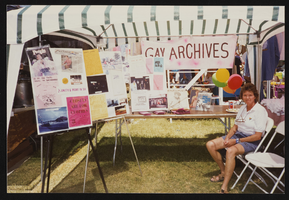Search the Special Collections and Archives Portal
Search Results
Hazel Gay oral history interview
Identifier
Abstract
Oral history interview with Hazel Gay conducted by Claytee D. White on December 02, 1995 for the Boyer Early Las Vegas Oral History Project. Gay discusses her husband being the first African-American mortician in Las Vegas, Nevada, as well as being the assistant manager at the Sands Hotel and Casino and an executive at the Union Plaza. Gay also discusses running dress shops and working as a display artist and retail clerk in other shops.
Archival Collection
James A. "Jimmy" Gay oral history interview
Identifier
Abstract
Oral history interview with James A. Gay III (Jimmy Gay) conducted by Perry Kaufman on April 12, 1972 for the Ralph Roske Oral History Project on Early Las Vegas. Gay discusses becoming the first African-American mortician in Las Vegas, Nevada and his work improving race relations, social, economic, and civic issues.
Archival Collection

Las Vegas Gay Archives of the UNLV Lied Library Special Collections Department booth at Gay Pride: photographic print
Date
Archival Collection
Description
Image
History: gay: Las Vegas: LGBTQIA Archive, 2016
Level of Description
Archival Collection
Collection Name: Dennis McBride Collection on LGBTQ Las Vegas, Nevada
Box/Folder: Box 26
Archival Component
James A. "Jimmy" Gay III oral history interview
Identifier
Abstract
Oral history interview with James A. (Jimmy Gay) Gay III conducted by Joyce M. Wright in 1973 for the Ralph Roske Oral History Project on Early Las Vegas. In this interview, Gay recalls details about his education in Arkansas and his training in mortuary science in Chicago, Illinois and discusses the nine-year delay in obtaining his license to practice as a mortician in Nevada because of racial discrimination. He recounts his move to Las Vegas, Nevada in 1946, his experiences as a recreation director and as a personnel and communications director for the hotel industry, work that he took while waiting for his licensure to practice. He also talks about his career as a mortician with Palm Mortuary in Las Vegas, the atomic testing of the 1950s and 1960s, and his long involvement with the NAACP and the Freedom Fund. He closes by reciting two poems that have inspired him and express his philosophy.
Archival Collection
Jimmy Gay oral history interview: audio clip
Date
Archival Collection
Description
Jimmy Gay discusses racism in Las Vegas before and after World War II. He says that prior to WWII, there wasn't a lot of prejudice, and there were only a few African American families. After WWII, he says that the influx of soldiers returning and the migration of Black families from the South led to Las Vegas becoming the "Mississippi of the West."
Sound
Las Vegas Gay Archives: correspondence, 1983-1985
Level of Description
Archival Collection
Collection Name: Las Vegas, Nevada LGBTQ Collection
Box/Folder: Box 03
Archival Component
Special Collections and Archives Oral History Research Center: archived website, 2014 to 2022
Level of Description
Archival Collection
Collection Name: University of Nevada, Las Vegas Web Archive
Box/Folder: N/A
Archival Component
Las Vegas Gay Archives of the UNLV Lied Library Special Collections Department booth at Gay Pride: photographic print, 1997
Level of Description
Archival Collection
Collection Name: Dennis McBride Photograph Collection
Box/Folder: Folder 037
Archival Component
Gay Kauffman oral history interview, 2006 October 11
Level of Description
Archival Collection
Collection Name: Nevada Test Site Oral History Project Records
Box/Folder: Digital File 01
Archival Component
